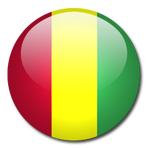International Headteacher
Menu
Full name: The Republic of Guinea
Population: 10.2 million (UN, 2011)
Capital: Conakry
Area: 245,857 sq km (94,926 sq miles)
Major languages: French, Susu, Fulani, Mandingo
Major religions: Islam, Christianity, indigenous beliefs
Life expectancy: 53 years (men), 56 years (women) (UN)
Monetary unit: 1 Guinean franc = 100 centimes
Main exports: Bauxite, alumina, gold, diamonds, coffee, fish, agricultural products
GNI per capita: US $400 (World Bank, 2010)
Internet domain: .gn
International dialling code: +224
Population: 10.2 million (UN, 2011)
Capital: Conakry
Area: 245,857 sq km (94,926 sq miles)
Major languages: French, Susu, Fulani, Mandingo
Major religions: Islam, Christianity, indigenous beliefs
Life expectancy: 53 years (men), 56 years (women) (UN)
Monetary unit: 1 Guinean franc = 100 centimes
Main exports: Bauxite, alumina, gold, diamonds, coffee, fish, agricultural products
GNI per capita: US $400 (World Bank, 2010)
Internet domain: .gn
International dialling code: +224
|
Although Guinea's mineral wealth makes it potentially one of Africa's richest countries, its people are among the poorest in West Africa.
Ruled by strong-arm leaders since independence, Guinea has been seen as a bulwark against instability in neighbouring Liberia, Sierra Leone and Ivory Coast. However it has also been implicated in the conflicts that have ravaged the region. After independence in 1958 Guinea severed ties with France and turned to the Soviet Union. The first president, Ahmed Sekou Toure, pursued a revolutionary socialist agenda and crushed political opposition. Tens of thousands of people disappeared, or were tortured and executed, during his 26-year regime. Economic mismanagement and repression culminated in riots in 1977. These led to some relaxation of state control of the economy. But it was only after the death in 1984 of Ahmed Sekou Toure, and the seizure of power by Lansana Conte and other officers, that the socialist experiment was abandoned - without reversing poverty. In 2000 Guinea became home to up to half a million refugees fleeing fighting in Sierra Leone and Liberia. This increased the strain on its economy and generated suspicion and ethnic tension, amid mutual accusations of attempts at destabilisation and border attacks. Acute economic problems, instability among its neighbours and uncertainty over a successor to its authoritarian president have prompted a European think-tank, the Crisis Group, to warn that Guinea risks becoming a "failed state". |
information provided by www.bbcnews.co.uk

